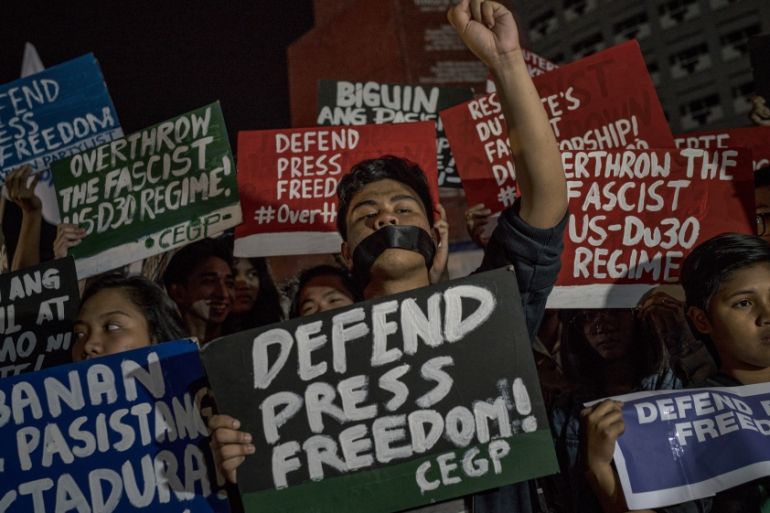Duterte bans Rappler reporters from presidential palace
Journalist group compares Philippine president to ‘petulant child’ and warns that his action is ‘anathema to democracy’.

The president of the Philippines has ordered that two journalists be banned from entering the presidential palace, an act one Filipino reporters’ rights group described as “appalling and extremely unbecoming” of a president.
Independent news website Rappler reported on Tuesday that Rodrigo Duterte directly ordered his presidential security team to bar the organisation’s CEO and one of its reporters from covering events at the palace.
Keep reading
list of 4 itemsPhilippine human rights campaigner granted bail
Families urge Philippines to work with ICC on ‘drug war’ probe
Philippine police officer jailed for killing teens in ‘drug war’
The report was later confirmed by state television PTV.
Rappler said the president made the decision after watching a Senate hearing, in which his most trusted aide, Christopher Go, was questioned for his role in a questionable military contract.
The story was first reported by the news website.
Harry Roque, Duterte’s spokesman, said on Tuesday that the Rappler reporter, Pia Ranada, can continue to cover his daily briefing pending a court decision on the news website’s closure case.
The briefing is regularly held in another building next to the presidential palace.
Roque also accused Rappler of “editorialising” in its news reports, an allegation the news outlet has denied.
In a statement on Tuesday, the National Union of Journalists of the Philippines (NUJP) said Duterte’s “peevishness displays a sinister side of his persona that does not bode well at all for the already uncertain health and future of democracy in our benighted country”.
“Duterte’s belligerence no longer surprises us. He has acted much like petulant child throwing a fit,” NUJP said.
“This, to say the least, is anathema to democracy.”
‘Autocratic leadership’
It is not the first time that Duterte has clashed with Rappler, a news website launched in 2012 that the president has repeatedly denounced as a source of “fake news”.
But Marites Vitug, Rappler’s editor at large, said the order is another “setback” to the Philippines, which prides itself on having the “freest press” in the Southeast Asia region.
“This is a dangerous situation, showing that Duterte doesn’t understand the role of the press in a democracy,” Vitug told Al Jazeera in a statement.
She said Duterte “blatantly disregards the duties of the press” by treating journalists as “subservient to the powers that be”.
![In January, the Philippine government tried to shut down Rappler [File: Reuters]](/wp-content/uploads/2018/02/73f265b50b5348e3b25564a16d2706cd_18.jpeg)
“He has no concept of checks and balance, displaying his autocratic leadership.”
In January, the president’s securities and exchange agency ordered that Rappler be shut down for allegedly violating rules restricting foreign ownership of Philippine media.
While Duterte has denied playing a role in that decision, critics said it was the president’s way of attempting to silence dissent.
Pending a court appeal, Rappler continues to be in operation from its headquarters in the capital, Manila.
Threats of violence
Duterte was also angered when Rappler published a report questioning the citizenship of his first foreign affairs secretary. The top diplomat turned out to be a former American citizen and was forced to resign.
The news website has also published a series of reports calling into question the Duterte administration’s deadly war on drugs and reported on the president’s alleged multi-million dollars worth of bank deposits.
|
|
But Rappler’s CEO Maria Ressa was also one of the first journalists to interview Duterte in 2015 as he prepared to run for president in May 2016.
Since the publication of the critical news reports, however, Rappler has come under continued attack by Duterte’s supporters online.
In various public events, Ressa said she and her fellow Rappler journalists have been repeatedly threatened with violence, including rape.
Inday Espina Varona, a journalist and political commentator, said “there is no legal excuse” for the Duterte administration to justify denying Rappler access to the palace.